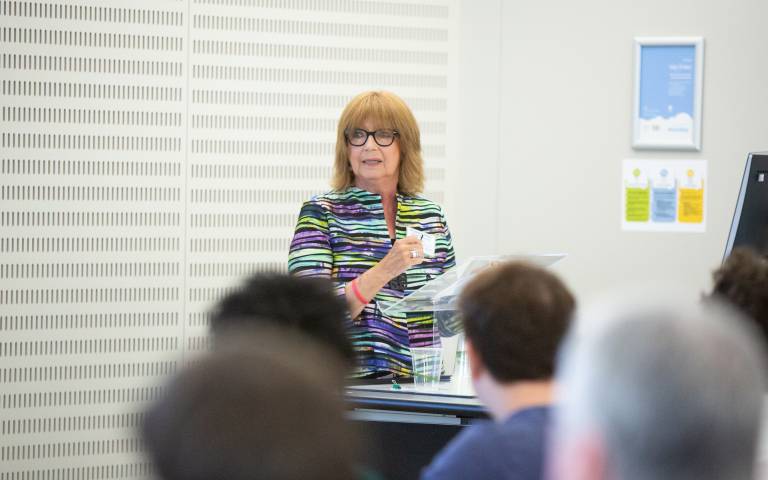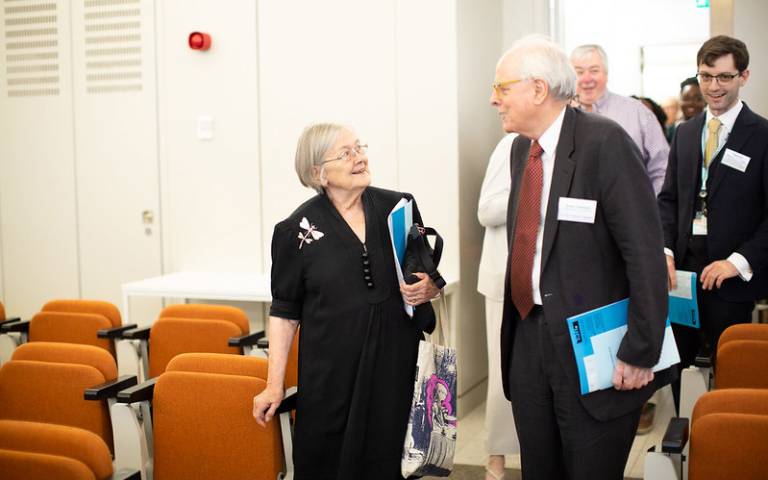UCL’s trailblazing Centre for Access to Justice marks 10 years
3 July 2023
The UCL Centre for Access to Justice (CAJ), which runs a clinic providing legal assistance to communities in east London and provides pro bono volunteering opportunities to law students, has marked its 10th birthday.

The centre, located in the UCL Faculty of Laws, combines teaching, research and evidence-based policy advice alongside pro bono legal work to advance its mission of improving access to justice.
Each year around 50 students volunteer at its clinic in Stratford, the UCL Integrated Legal Advice Clinic (UCL iLAC), assisting staff in all aspects of service provision and helping to improve the material well-being of the surrounding community. In addition to the students volunteering at UCL iLAC, over 100 students work with partner organisations across London, supporting their work and embedding themselves within the community.
UCL iLAC is the only university clinic to have a legal aid contract (meaning that some of its legal advice in the areas of housing and community care is partly government funded) and last year, in recognition of its important work, it won the Legal Aid Firm/Not for Profit Agency award at the Legal Aid Lawyer of the Year Awards. Over seven years, staff and students at the Clinic have helped more than 700 clients and worked on more than 1,000 cases.
Rachel Knowles, CAJ Head of Legal Practice and Associate Professor (Teaching) at UCL Laws, said: “I am proud of our amazing team of staff and students and the work we are doing. Expertise in social welfare law is rapidly dwindling due to cuts to legal aid, and I am very grateful for UCL’s support of our mission to inspire the next generation of social welfare lawyers whilst offering much-needed support to the community.”
Testimonials from people it has served tell a powerful story. “Since 2015, the service and help I have received from the clinic has changed my life completely,” says one client. “They have helped me deal with issues from debt to welfare benefits… I owe everything to them.”
She said: “Newspapers and TV are full of heroic legal battles, but every day some of the most vulnerable and challenged members of our society are blighted by the inability to secure the most basic safety net legal rights and entitlements provided by the State.
“I often say that we should judge a society not by the rights ostensibly given to citizens but by the measures in place to make those rights effective. In our small way we contribute to making rights effective and in the process we improve material, emotional and physical wellbeing and provide lasting real-world insights for our students into the power of law to transform lives.”
Baroness Hale of Richmond, an honorary professor at UCL Laws – who was the first female member of the UK Supreme Court and who later became its president – described the clinic in her speech as an “important example of a university providing benefits for the community – improving access to justice for the clients from low income and vulnerable groups but also improving awareness and expertise in the student and legal community”.
Lady Hale added: “It provides a solid example of how seriously UCL takes its social responsibility. It makes me proud to be associated with UCL.”

UCL President & Provost, Dr Michael Spence, echoed this view, saying he was “personally very supportive” of the centre’s mission and keen for universities to provide a “tangible contribution” to their local community.
Other speakers included Professor Eloise Scotford, Dean of UCL Laws, who said access to justice was a priority for the faculty, and UCL alumnus Lord McNally, who helped to launch the centre in 2013 as Liberal Democrat Minister of State for Justice.
A video played at the event (embedded above) featured testimonials from students, staff and one former client at the UCL iLAC clinic who had received advice after her tenancy was cancelled.
One testimonial was from Thembi Fakoya-Sales, a UCL Laws alumna. She said: “The Centre for Access to Justice helped shape my career by allowing me exposure to a world I otherwise would never have known about. I definitely wouldn’t be doing the job I am doing now without them.”
In the opening comments of the video, Dame Hazel noted that the current economic period was very challenging for a lot of people and that “we have a chance to make a difference”.
She explained: “Making sure that people get the benefits to which they are entitled means that you improve their material well-being, it means that you improve the environment into which children are born, and you improve their life chances. It sounds very grand but it isn’t. It’s just something you can do that … makes a difference. And I think that is unbelievably rewarding and important and great that our students are doing it.”
Links
- UCL Centre for Access to Justice
- UCL Integrated Legal Advice Clinic
- Professor Dame Hazel Genn’s academic profile
- UCL Laws
Image
- Top: Professor Dame Hazel Genn at the 10th anniversary. Middle: Baroness Hale of Richmond and Professor Sir Ross Cranston. Bottom: Attendees at the 10th anniversary event. Credit: UCL Laws
Media contact
Mark Greaves
E: m.greaves [at] ucl.ac.uk
 Close
Close



